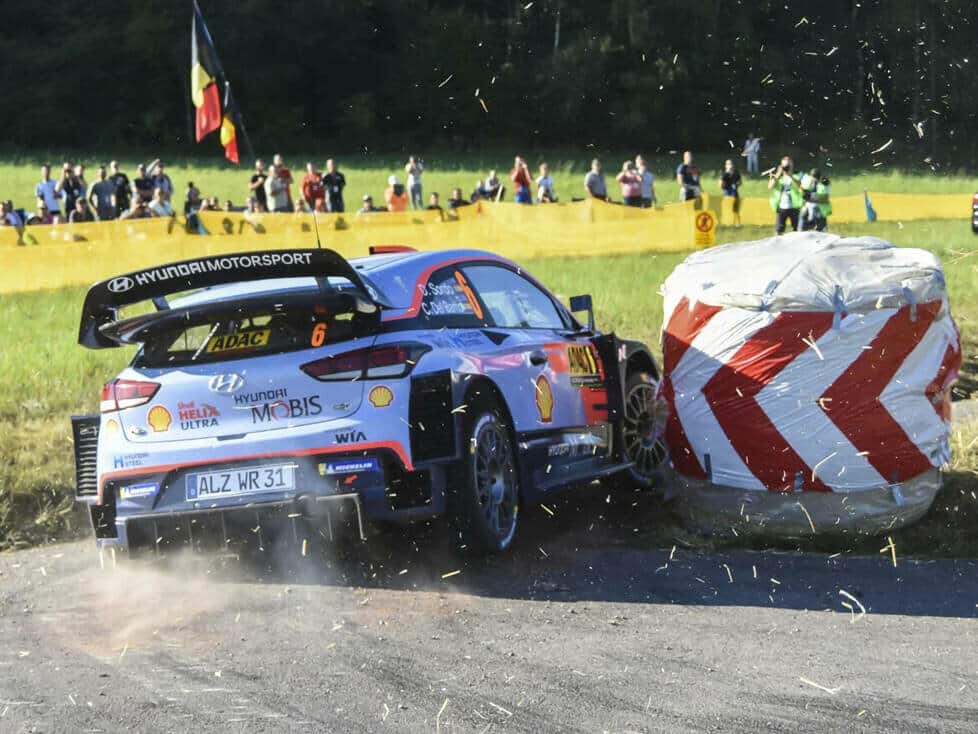Virtual chicanes used for the first time in the World Rally Championship at the Rally Finland – drivers see safety risk
Premiere in the World Rally Championship (WRC): Virtual chicanes will be used for the first time at this weekend’s Rally Finland. Instead of using physical obstacles in the form of straw bales to slow the cars down on fast sections, certain areas on the route will be defined for the first time where the drivers will have to slow down to 60 km/h.
300 meters before the virtual chicane, drivers are alerted to the slow-down area by warning beacons at the edge of the track. However, the key aid is the GPS tracker in the car’s center console, which also counts down the distance and lights up green as soon as the car has reached 60 km/h and is allowed to accelerate again.
This solution in particular met with criticism from the drivers after an initial test during the shakedown, as they believe it poses a safety risk. “This system that they have given us is very bad,” said Hyundai driver Esapekka Lappi, not mincing his words.
“They [the FIA] could easily make it safer and more efficient, but they don’t want to,” the Finn criticizes the world automobile association. “I have to take my eyes off the road and look for a green light. That’s okay in shakedown because the speed is low, but in Ouninpohja you arrive at 185 kilometers per hour and I don’t want to take my eyes off the road. That’s a bad system. “
Criticism from drivers: the view goes from the road into the cockpit
Toyota driver Elfyn Evans also feels uncomfortable at the thought of having to look at the GPS tracker screen instead of the road. “I don’t think it’s very consistent, and what I’ve also noticed is that your eyes aren’t on the road at all,” says the Welshman.
Eight-time world champion Sebastien Ogier also joins the chorus of critics. In his opinion, there are better solutions. “I’ve heard that they use a radar and a board in the Finnish championship, and when the board turns green, you can drive. That seems to be a better idea and more reliable,” says the Frenchman.
“Maybe that’s an idea to think about for the future, especially because then you have your eyes on the road, whereas with the current solution you are forced to look into the cockpit, which is not exactly conducive to safety,” said Ogier.
Is the GPS signal accurate enough?
The Frenchman also doubts that the GPS signal is accurate enough to reliably monitor compliance with the speed limit. “We are a little dependent on technology. Today we sometimes fight for the blink of an eye, I recently lost a rally by 0.2 seconds,” said Ogier.
A precise measurement is crucial for the success of the virtual chicanes, as there are severe penalties if 60 km/h are exceeded. Drivers receive a two-second time penalty for every excess km/h. Too much from the point of view of M-Sport team boss Richard Millener.
“That’s the highest time penalty you can get in rallying,” says Millener. “If you have a problem or something goes wrong or something crazy happens to someone, the rally is practically over if you’ve driven 20 kilometers too much. “
FIA defends the system
Former rally co-driver Nicolas Klinger, now FIA safety delegate, defends the solution used in Finland, which will be used on Saturday’s fast special stage “Ouninpohja”.
“The system is simple. At 300 meters, 200 meters and 100 meters there is a warning on the tracking box,” explains Klinger. “The driver slows down until he reaches the right speed, then the display turns green and you drive normally again.”
Furthermore, the GPS tracker is nothing new and has already proven its worth in the past. “The tracker has long been used for safety reasons and displays red flags so that you can be sure they are visible and the passenger is also informed,” he says.





